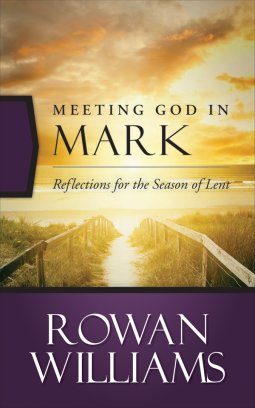Rowan Williams' 'Meeting God in Mark' is Perfect for Lent ... Or Anytime
 I now want to buy everything Rowan Williams has ever written. I won't, of course. Probably. But his incredible book on Mark has won a fan-girl in me.
I took a year of New Testament theology while I was an undergrad for fun. I did a semester of seminary for pretty much the same reason.
I now want to buy everything Rowan Williams has ever written. I won't, of course. Probably. But his incredible book on Mark has won a fan-girl in me.
I took a year of New Testament theology while I was an undergrad for fun. I did a semester of seminary for pretty much the same reason.
It's hard to write a Christian book that impresses me, but Williams did it.
Meeting God in Mark: Reflections for the Season of Lent was originally a series of Holy Week talks Rowan Williams gave in 2010, when he was Archbishop of Canterbury. It is, he says in the introduction, mostly transcribed from recordings and unaltered.
The book's 108 pages contain reflection and group discussion questions, as well as a Lenten reading schedule and Sunday reflections. It retails for $12 from Westminster John Knox Press. It's .
Williams makes the case that the gospel of Mark is often overlooked or is considered a light, less sophisticated version of Matthew and Luke.
He describes his purpose as "an attempt to help us read Mark slowly, to go back over the surface of simplicity of the text and tune in to some of the deeper themes — above all to listen to the various ways in which Mark is challenging us not simply to read but to expose ourselves to a new and transforming relationship with the figure at the heart of the story."
Why you might want to read Meeting God in Mark:
Williams strikes a perfect balance between scholarship and relationship with the text.
He gives fresh eyes to familiar scriptures and considers how Mark's first readers might have seen the book.
He illuminates that just because the book was likely developed in community does not make it impersonal or simply a collection of folk tales.
And at the end of the day, he explains how revolutionary (and I don't use that word lightly) the picture of God in Mark's gospel is.
Williams is a wonderful writer. He never talks down, but he's always accessible and not the least bit stuffy.
He is wise. He's careful without tiptoeing. You get the feeling he knows his subject deeply, cares about it, and wants to share it.
Why you might not want to read Meeting God in Mark:
If you are looking for a daily devotional rather than an exploration that includes biblical scholarship or analysis, you should skip this title.
If your view of biblical inspiration is that biblical writers were taking dictation from God, you will be frustrated. The book delves into the process of how scholars believe Mark was written. I don't mean that to be sarcastic. I understand that some Christians do believe God literally inspired each and every word, exactly as it was written. Please don't give this book to them. They will get lost in the scholarship and lose the message.
Williams challenges — gently — the notion of substitutionary atonement, the idea that Jesus died to pay a ransom to save people. This idea could be threatening to some Christians. For others of us, it is a welcome change. To believe that God is love and somehow demands death is a paradox it becomes harder to hold in my mind the older I get. Williams offers an alternative, one that is not some watered down easy theology, and not an idea that requires less faith. But it does ring truer.
My conclusions:
This is one of the best books on Jesus or the gospels I have ever read. It immediately made me want to go back and read the gospel of Mark — and all of the gospels, with fresh eyes.
A word of warning, however: It also made me want to buy copies for several people (something I rarely, if ever, do) and to buy everything Rowan Williams has ever written. It could be hard on your wallet.